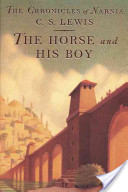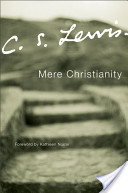
Just finished reading C.S. Lewis’ The Horse and His Boy with one of my girls. What did she learn?
- To listen to the Lion, i.e., God
- Beware of pride

How about these as Lenten lessons? In my April 1 reading of The Business of Heaven: Daily Readings from C.S. Lewis (C.S. Lewis, Walter Hooper. Houghton Mifflin Harcourt. 1984), I was reminded of C.S. Lewis’ focused thoughts on “The Great Sin” of pride/self-conceit (Mere Christianity. MacMillan, 1975, Book III, Chapter 8). Below’s a challenging section:
According to Christian teachers, the essential vice, the utmost evil, is Pride. Unchastity, anger, greed, drunkenness, and all that, are mere fleabites in comparison: it was through Pride that the devil became the devil: Pride leads to every other vice: it is the complete anti-God state of mind.
Does this seem exaggerated? If so, think it over. I pointed out a moment ago that the more pride one had, the more one disliked pride in others. In fact, if you want to find out how proud you are, the easiest way is to ask yourself, ‘How much do I dislike it when other people snub me, or refuse to take any notice of me, or shove their oar in, or patronize me, or show off?’ The point is that each person’s pride is in competition with everyone else’s pride. It is because I wanted to be the big noise at the party that I am so annoyed at someone else being the big noise. Two of a trade never agree. Now what you want to get clear is that Pride is essentially competitive – is competitive by its very nature – while the other vices are competitive only, so to speak, by accident. Pride gets no pleasure out of having something, only out of having more of it than the next man. We say that people are proud of being rich, or clever, or good-looking, but they are not. They are proud of being richer, or cleverer, or good-looking than others. If everyone else became equally rich, or clever, or good-looking, there would be nothing to be proud about. It is the comparison that makes you proud: the pleasure of being above the rest. Once the element of competition has gone, pride has gone. That is why I say that Pride is essentially competitive in a way the other vices are not. The sexual impulse may drive two men into competition if they both want the same girl. But that is only by accident; they might just as likely have wanted two different girls. But a proud man will take your girl from you, not because he wants her, but just to provide to himself that he is a better man than you. Greed may drive men into competition if there is not enough to go round; but the proud man, even when he has got more than he can possibly want, will try to get still more just to assert his power. Nearly all those evils in the world which people put down to greed or selfishness are really far more the result of Pride (109-110).
Do you remember how Shasta’s courageous act of defending his Aravis and Hwin humbles his fellow travelers? Stepping partway into Bree’s lament:
“At least he [Shasta] ran in the right direction: ran back. And that is what shames me the most of all. I, who called myself a war horse and boasted of a hundred fights, to be beaten by a little human boy — a child, a mere foal, who had never held a sword nor had any good nurture or example in his life!”
“I know,” said Aravis. “I felt just the same. Shasta was marvelous. I’m just as bad as you, Bree. I’ve been snubbing him and looking down on him ever since you met us and now he turns out to be the best of us all. But I think it would be better to stay and say we’re sorry than to go back to Calormen.”
“It’s all very well for you,” said Bree. “You haven’t disgraced yourself. But I’ve lost everything.”
“My good Horse,” said the Hermit, who had approached them unnoticed because his bare feet made so little noise on that sweet, dewy grass. “My good Horse, you’ve lost nothing but your self-conceit. No, no, cousin. Don’t put back your ears and shake your mane at me. If you are really so humbled as you sounded a minute ago, you must learn to listen to sense. You’re not quite the great Horse you had come to think, from living among poor dumb horses. Of course you were braver and cleverer than them. You could hardly help being that. It doesn’t follow that you’ll be anyone very special in Narnia. But as long as you know you’re nobody very special, you’ll be a very decent sort of Horse, on the whole, and taking one thing with another. . . .” (C.S. Lewis. The Horse and His Boy. Harper Collins, 1995, 152).
Please take a few minutes today to join me in . . .
- Listening to Jesus the Christ through the Word, Spirit, and teaching of the people of God.
- Confessing pride/self-conceit.
- Asking forgiveness of those whom we have been put down, i.e., suffered under our competitiveness.
- Praying for a growing desire to serve, even defend, those in need which surround us.
- Approaching Palm Sunday, Holy Week, and Easter with a growing passion to declare our love for the One in whom we find the Way, the Truth, the Life, the Father, and the Spirit. Jesus, the Spirit, and the Body of Christ stand with us during our times of trial and temptation. Do we likewise acknowledge our love for God, the people of God, and those whom He has called us to serve when tempted to turn our back?
Tom enjoys daily conversations regarding living out the Biblical Story with his wife Theresa and their four girls, around the block, at Elizabethtown Brethren in Christ Church (where he teaches adult electives and co-leads a small group), among healthcare professionals as the Northeast Regional Director for the Christian Medical & Dental Associations (CMDA), and in higher ed as a volunteer with the Emerging Scholars Network (ESN). For a number of years, the Christian Medical Society / CMDA at Penn State College of Medicine was the hub of his ministry with CMDA. Note: Tom served with InterVarsity Christian Fellowship / USA for 20+ years, including 6+ years as the Associate Director of ESN. He has written for the ESN blog from its launch in August 2008. He has studied Biology (B.S.), Higher Education (M.A.), Spiritual Direction (Certificate), Spiritual Formation (M.A.R.), Ministry to Emerging Generations (D.Min.). To God be the glory!

I’d say Shasta and his father are very lucky that he turned out that way. He had a pretty terrible upbringing and wasn’t taught how to do right. Some of that shows, but surprisingly little. And the people of Archenland were also lucky, or they might have had a king with as little character as Rabadash. Shasta came out more fit to be king than his brother, who had a much better upbringing.
Lovely reflection! Thank you Tom!